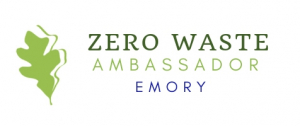
5 Hard-to-Recycle Materials and What To Do With Them
By Candace Allison, MPH Candidate in Behavioral, Social and Health Education Sciences
When most people hear the word “recycle,” they think of plastic, cardboard, and glass. And those items are certainly the most commonly recycled items. But what about the items that you use that may be harder to recycle? Maybe you previously thought that the items couldn’t be recycled at all. Emory collects hard to recycle materials at collection sites in most major campus buildings. You can find a map for collection sites and more information here. There are also organizations that are designed to take hard to recycle materials and divert them from landfills, but it seems like many people don’t know about them. Here are five hard-to-recycle, common household items and what to do with them.
Pill Bottles 
Most Americans have had to take a prescription pill at some point in their lives. Some people have to take one or multiple medications daily. Even though prescription medication bottles are made from plastic (mine are usually #7), many curbside recycling programs will not accept them. Some pharmacies say that they take them back. I tried to take my plastic prescription bottles back to the pharmacy for recycling and I watched the pharmacist throw them in the trash right in front of me. Since then, I have been on the hunt for a solution to this problem and I recently found one. Matthew 25 Ministries is a nonprofit based in Cincinnati, Ohio. Their mission is to provide humanitarian aid to various countries (including the US) with items that would normally be thrown away. They take a variety of items (more information can be found here), and this includes pill bottles! They send these bottles to countries experiencing a shortage of medical supplies. Bottles that cannot be used are recycled and can sometimes generate revenue for the organization. More information about preparing pill bottles for shipment and where to send them can be found here.
Batteries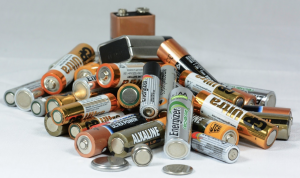
Ideally, we should all be moving toward using rechargeable batteries. As I have been transitioning from alkaline batteries (the standard batteries you find at the store), I have been saving them, hoping I could find a place to recycle them and there are actually a few options! Firstly, Emory collects batteries (along with other hard-to-recycle materials) in collection bins in major campus buildings. Find collection bins and more information here. Batteries Plus Bulbs, a store that sells all kinds of batteries and light bulbs (duh), has a recycling program in their stores. All you have to do is take your batteries (and lightbulbs) to a location near you and they take care of the rest! Please note that there are sometimes fees, depending on your location, for dropping off materials. If that presents a challenge for you, try partnering with a friend, your workplace, your residence hall or family to help offset some of those costs. Find more information here. If you prefer to ship batteries or want to drop them off for free, turn to Call2Recycle, the country’s largest and more reliable battery recycling program. They have drop off locations at Staples, Home Depot and Lowe’s, among others. You can also ship batteries to them if you prefer. More information can be found here. Finally, for when your rechargeable batteries wear out (which they eventually will), you can send them to GreenDisk recycling. You can recycle 25 pounds of electronics for $15 dollars. Again, there are creative ways to cost share if needed. GreenDisk also recycles a variety of other electronic items. Find out more here.
Clothing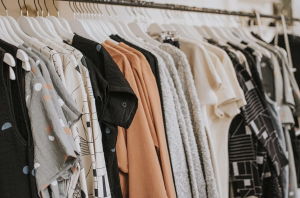
Wait, Candace, clothing can be recycled??? It most certainly can, friends! Ideally, if your clothes are still in wearable shape (aka gently used), you could host a (virtual, these days) clothing swap with friends, family, co-workers and classmates. You could also try and sell clothes online with things like Ebay, Poshmark, Depop and ThredUp. But what about clothes that are so worn out that they won’t sell? Some thrift stores, like American Thrift, are conscious of recycling items that can’t be sold. They also partner with Children’s Healthcare of Atlanta and Emory Student Move Out. Textile recycling is a difficult process because most clothing is made with synthetic materials or a blend of synthetic and natural fibers. For effective recycling to happen, those materials have to be broken down separately which presents challenges. Companies such as ForDays offer a one time fee for recycling clothing. Even though they are their own brand, you can send all of your used clothing to them for recycling for $10. They send you a bag and you fill it, it’s that simple! Once they receive your shipment, they recycle them. They ask that you wash the clothes before sending them. Find more information here. If you’re looking for a free recycling option, Planet Aid has donation box locations and clothing drives across the country. Find a donation box or clothing drive near you here. Emory also participates in textile recycling. They send uniforms to re:loom, an organization located in Decatur, GA, where they upcycle clothing into household goods. The sale of goods fund salaries and benefits for employees who were formerly housing-insecure and/or immigrants of refugees. Learn more about re:loom here.
Shoes 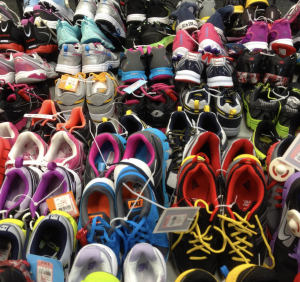
There are very few shoe recycling options out there. More companies are beginning to take back their own shoes but few are willing to take back any brand. There is, however, one organization and one brand that are willing to take any type or brand of shoe. The first one is Soles4Souls. This organization is fairly well known and their mission is to provide shoes for people who are underprivileged. Something that is important to note, however, is that Soles4Souls only accepts gently used shoes. You can find more information about Soles4Souls here. Your shoes that are destroyed or absolutely worn out can be sent to Nike Grind, a program that accepts unwearable shoes, grinds them down and repurposes that material into other items such as new shoes, carpet padding and indoor courts to name a few. Find out more about Nike Grind here.
Mattresses 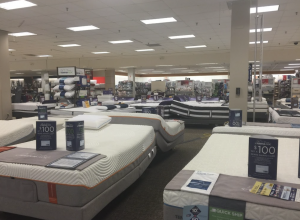
Finally, let’s talk about your mattresses. Mattresses can be recycled locally at CHaRM, which is the Center for Hard-to-Recycle Materials in Atlanta, GA. CHaRM accepts a wide variety of hard-to-recycle materials from mattresses and tires, to appliances and musical instruments. Charm is accepting donations via appointments. More information can be found here.

Where can one ecycle old clothing not fit for wear but used for cloth and good buttons, in Decatur or Altanta
This article is a treasure trove of information. Fantastic job!